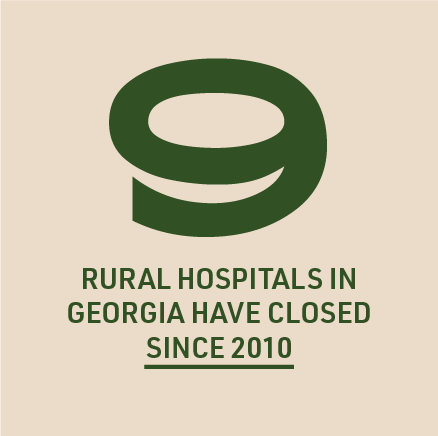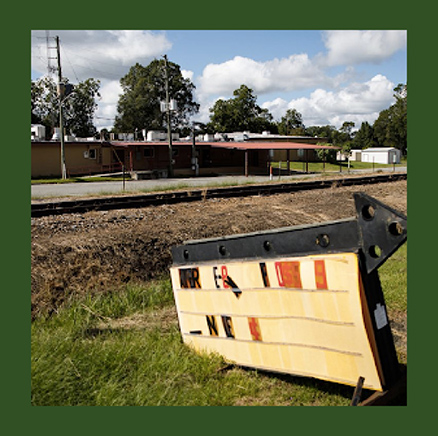- Home
- >
- Georgia Can’t Wait
Georgia Can’t Wait

 Since 2010, 9 rural hospitals have closed in Georgia. That puts Georgia third in the nation for hospital closures behind Tennessee and Texas. Rural hospitals in states with no Medicaid expansion are more likely too close, shutting off access to care for their communities.
Since 2010, 9 rural hospitals have closed in Georgia. That puts Georgia third in the nation for hospital closures behind Tennessee and Texas. Rural hospitals in states with no Medicaid expansion are more likely too close, shutting off access to care for their communities.
When a hospital closes in a rural community, the effects ripple through every aspect of community life. The hospital’s doctors and nurses move to other communities. Residents are left without access to emergency care and other important health services. The businesses around the hospital may close—a local pharmacy, the downtown diner, or the florist. Jobs are lost and businesses become reluctant to move to the area because it lacks health care.
Georgians in every corner of our state deserve local health access.
How can your voice be heard?
We want to amplify your story. Our fellow Georgians, including our lawmakers, need to hear about the challenges and victories Georgians have in meeting their health care needs.
Experiences like yours let lawmakers know what’s working, and what’s not. They show our leaders why we need to change policies for the better, and which programs we must champion. Let us work with you to share your health care story.
Georgians for a Healthy Future is highlighting 2 hospital closures to illustrate how communities struggle when hospitals are allowed to fail.
Here are their stories:

In Cuthbert, the decision to shut the hospital in October 2020, meant the end of an era. Southwest Georgia Regional Medical Center opened in Cuthbert in 1947. Through the years, the hospital was a source of pride in Randolph County, where Cuthbert is the county seat.
The closure has been especially hard on the black population in the area. According to Sheps Center’s North Carolina Rural Health Research Program, rural communities with large black populations are more likely to be financially struggling. Randolph County is 60% black and the surrounding counties that relied on the hospital have a nearly 50% black population.
The loss of the hospital in Cuthbert came at the worst time for residents of Cuthbert, as this part of the state was one of the hardest hit by the COVID-19 pandemic. Families were left without medical care nearby and the ambulance service was too slow to adequately respond to emergencies. With the region so hard hit by COVID and no medical care available for miles, it made life-threatening emergencies more dangerous and heartbreaking.
Former SGRMC Nurse Rhonda Jones remembers receiving a call to assist an elderly patient who was having a medical emergency. “The lady who was having the emergency ended up being my Aunt. I was called to perform life-saving measures because the emergency medical response could not get there in time. She ended up not making it,” Rhonda said. "It’s becoming like a ghost town. Back in the day, we had a hospital, we had two doctor’s offices. And, now, we chose a Dollar General over medical care. I mean, you can’t get medical care at Dollar General.”

 When the Lower Oconee Community Hospital closed in 2014, residents in the area were left with a 35-40 minute drive to the closest hospital.
When the Lower Oconee Community Hospital closed in 2014, residents in the area were left with a 35-40 minute drive to the closest hospital.
The loss of a hospital to a community can be devastating beyond the loss of healthcare. In 2014, when the Lower Oconee Community Hospital in Glenwood shuttered for good, residents within Wheeler County – population around 8,000 – were left with the daunting reality that there was no longer a hospital within the county. Businesses in the area were left reeling, as Lower Oconee Community Hospital was the largest employer in the city. Shortly after the hospital closed, Glenwood’s only restaurant closed. The only bank in town shut down shortly after. 8 years later, Glenwood is still without a bank.
How can a community survive without a hospital and a bank?
Georgia can't wait!
Ask your elected officials to expand Medicaid today:
You can start making a difference in how health policy is made in our state and have your voice heard! Legislators hear from lobbyists all day long but what they don’t hear is from concerned citizens who have a personal story to share. Use the form below to find your legislators and write a letter and make your voice heard!





